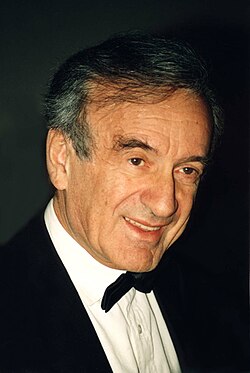Elie Wiesel Quote
Why do you pray? he asked me, after a moment. Why did I pray? A strange question. Why did I live? Why did I breathe?I don't know why, I said, even more disturbed and ill at ease. I don't know why.After that day I saw him often. He explained to me with great insistence that every question possessed a power that did not lie in the answer. Man raises himself toward God by the questions he asks Him, he was fond of repeating. That is the true dialogue. Man questions God and God answers. But we don't understand His answers. We can't understand them. Because they come from the depths of the soul, and they stay there until death. You will find the true answers, Eliezer, only within yourself! And why do you pray, Moshe? I asked him. I pray to the God within me that He will give me the strength to ask Him the right questions.
Why do you pray? he asked me, after a moment. Why did I pray? A strange question. Why did I live? Why did I breathe?I don't know why, I said, even more disturbed and ill at ease. I don't know why.After that day I saw him often. He explained to me with great insistence that every question possessed a power that did not lie in the answer. Man raises himself toward God by the questions he asks Him, he was fond of repeating. That is the true dialogue. Man questions God and God answers. But we don't understand His answers. We can't understand them. Because they come from the depths of the soul, and they stay there until death. You will find the true answers, Eliezer, only within yourself! And why do you pray, Moshe? I asked him. I pray to the God within me that He will give me the strength to ask Him the right questions.
Related Quotes
About Elie Wiesel
As a political activist, Wiesel became a regular speaker on the subject of the Holocaust and remained a strong defender of human rights during his lifetime, advocating for justice in numerous causes around the globe, including that of Soviet Jews and Ethiopian Jews, South African apartheid, the Rwandan genocide, the Bosnian genocide, the War in Darfur, the Kurdish independence movement, the Armenian genocide, Argentina's Desaparecidos, Nicaragua's Miskito people, the Sri Lankan Tamils, and the Cambodian genocide. He was also an outspoken advocate for Israel and frequently weighed in to support the country during escalations of the Arab–Israeli conflict and throughout the Iran–Israel proxy conflict, while also hosting direct talks to facilitate the Israeli–Palestinian peace process.
Wiesel was a professor of the humanities at Boston University, which created the Elie Wiesel Center for Jewish Studies in his honor. He received a number of awards, including the Nobel Peace Prize in 1986. He was a founding board member of the Human Rights Foundation and remained active in it throughout his life. Wiesel was one of the main figures who spearheaded the establishment of the United States Holocaust Memorial Museum in 1993.
